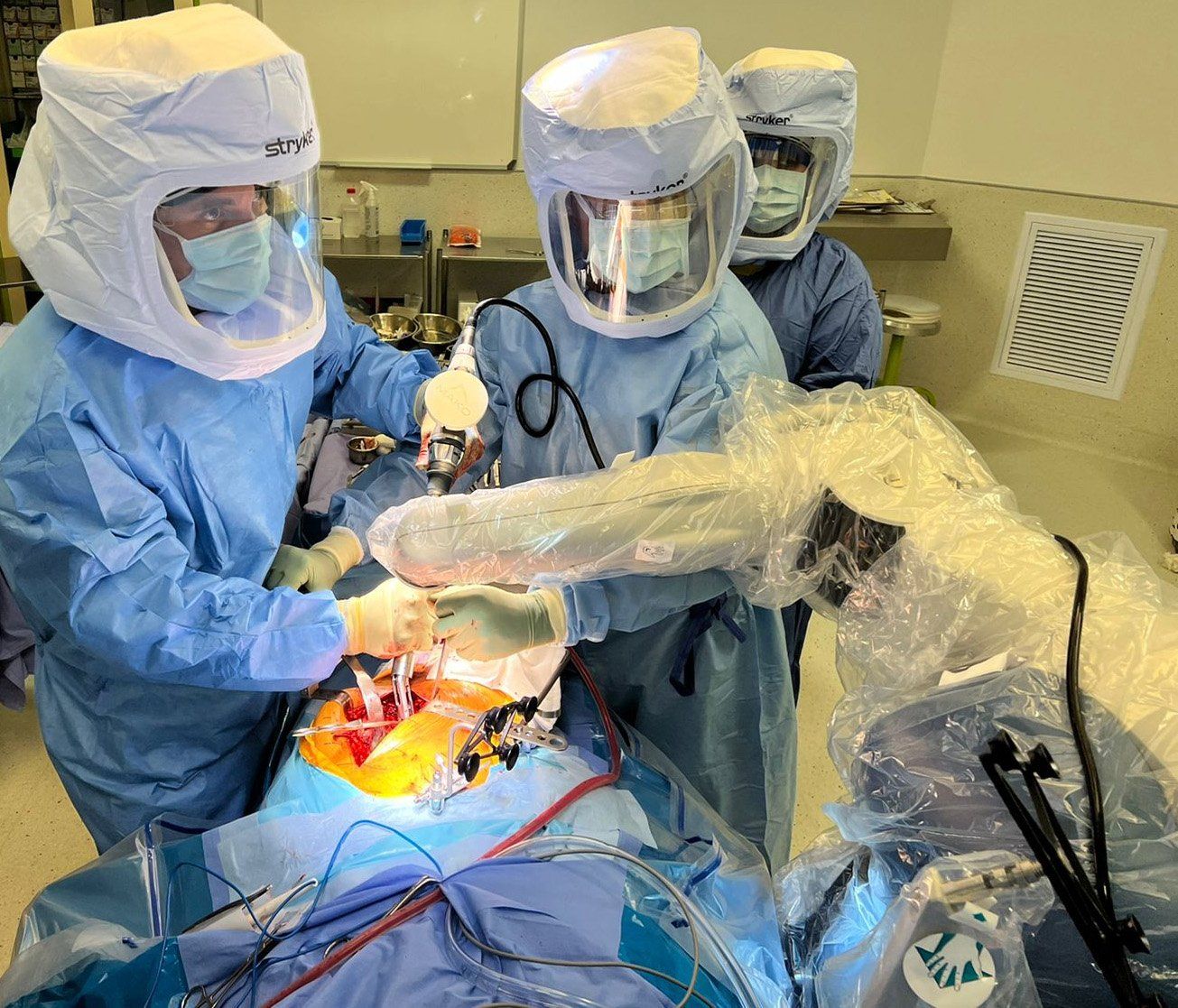Robotic assisted knee and hip replacements established in Pretoria
(Left to right) Dr Wian van der Merwe, an orthopaedic surgeon practising at Netcare Pretoria East Hospital, is pictured performing knee replacement surgery with the advanced Mako SmartRobotics system, assisted by registered nurse Madri van der Sandt and enrolled nurse Dineo Mokone. Dr Van der Merwe is one of three orthopaedic surgeons practising at the hospital who are accredited to do robotic assisted hip and knee replacements. By June, three more orthopaedic surgeons will complete the final leg of their accreditation to perform robotic assisted hip and knee surgery.
Orthopaedic surgeons trained in high tech precision option
A team of orthopaedic surgeons at Netcare Pretoria East Hospital, using a state of the art robotic surgical system, are expanding the options in hip and knee replacements for patients from northern Gauteng and surrounding provinces.
“We congratulate orthopaedic surgeons Dr Wian van der Merwe and Dr Tiaan Stoffberg on achieving full accreditation last year in the use of this advanced technology, for the benefit of those in need of such surgery,” says Pieter Louw, general manager of Netcare Pretoria East Hospital.
To achieve accreditation, the specialists completed comprehensive training in Istanbul, Turkey, with the new SmartRobotics™ surgical system.
The Mako robotic system at Netcare Pretoria East Hospital is the first in Tshwane and one of only a handful of these advanced systems in South Africa. Dr Van der Merwe performed the first robotic assisted hip and knee surgeries at the hospital in late November 2021, and many more patients have since chosen to have this option for their surgery.
“By the end of June, a further two orthopaedic surgeons practising at our hospital will complete the final leg of their accreditation in the use of the robotic assisted system. This will result in a total of four experienced orthopaedic surgeons offering this option to people requiring knee and hip replacements at our facility,” Louw says.
Surgical expertise meets robotic technology
Dr Van der Merwe explains that the Mako robotic system is designed to further improve surgical precision. The technology assists the surgeon in the planning of the procedure beforehand, and provides additional checks in real-time at each stage during the operation.
“Based on a CT scan of the patient’s knee, the system’s sophisticated software develops a three-dimensional digital map of the knee, and calculates the optimal implant size, placement and alignment of the prosthetic knee joint to fit the patient’s specific anatomy. This data is then translated into a preoperative surgical plan,” Dr Van der Merwe says.
The system combines three key components – 3D CT scan based planning, AccuStop technology and insightful data analytics – into one platform for more predictable and personalised orthopaedic procedures.
Precision and extra safeguards
“This offers an extra level of precision, adding to the surgeon’s own technique and experience. On the day of the procedure, the digital 3D map of the knee is carefully aligned to the patient’s actual knee in theatre, and the surgical plan is validated,” he explains.
“The dimensions needed for the procedure are set, and at these boundaries cutting automatically stops, serving as an additional safeguard to preserve the surrounding soft tissues and healthy bone. The resections achieved are extremely accurate to the surgical plan, being within a fraction of a millimetre,” Dr Van der Merwe says.
As the surgeon guides the robotic arm system, it provides detailed visual, auditory, and tactile feedback. “The robotic system cannot do anything without the surgeon. Rather, it helps keep the surgeon within the optimal dimensions to match the patient’s individual anatomy through the defined surgical plan.”
Why accuracy matters
The stability of the knee joint, as well as the range of motion and comfort a person enjoys after a knee or hip replacement can be greatly influenced by the accuracy of the fit of the prosthetic joint for the specific patient.
“In addition, where there is minimal interference with the surrounding soft tissues, the post-operative recovery can often be quicker. This technological advance is a further tool we can use to help deliver advantages such as these for our patients,” Dr Van der Merwe says.
“We are pleased that the introduction of this Mako robotic system now offers this world class option to more patients in need of knee or hip replacement surgery. Netcare Pretoria East Hospital is only the fourth facility within the Netcare Group where robotic assisted knee and hip replacement surgery is available, answering to the demand already seen at Netcare Linksfield, Netcare Pinehaven and Netcare Blaauwberg hospitals,” Louw concludes.













